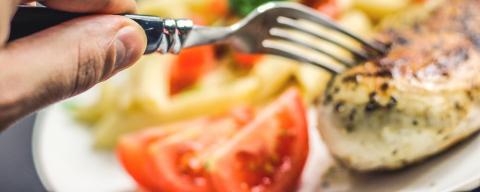Five Safety Considerations for Cooking Challenges on Social Media
Social media provides a fun way to learn new recipes. You might follow accounts like UNH Extension Nutrition Connections that share seasonal dishes and creative ways to use fresh produce.
But there are some harmful online cooking challenges that go “viral” on platforms like Facebook, Instagram, TikTok and Twitter. A recent TikTok challenge that encourages people to cook chicken in NyQuil has prompted the FDA to issue a safety notice about the dangers of misusing nonprescription medications. Social media users, especially young adults, might want to attempt a challenge like this to be funny, but the consequences are serious.
It is helpful to keep medication such as cough syrup out of the kitchen and you can call Poison Control at (800) 222-1222 if you suspect an overuse of medication. Cooked medications can cause toxic fumes that affect the lungs; it is important to only use food and beverage items when preparing recipes.
Where did the cooking challenge originate? Was it created by a trusted chef, restaurant or food specialist? Do you personally know anyone who has taken part in this challenge and can verify that it’s safe?
Before trying a new recipe, understand the temperature requirements. To be sure food is cooked to a safe temperature, use a food thermometer. Steaks, pork chops, fish and seafood should be cooked to a minimum internal temperature of 145°F, ground beef to 160 °F and poultry to 165 °F.
Always wash hands in warm, soapy water before preparing food and after using the bathroom or tending to children and pets. Wash hands after cutting raw meat, poultry or fish and before handling other foods. Separate cooked food from raw foods during preparation.
Keep raw meat separate from fruits and vegetables to avoid cross-contamination. When storing meat in the fridge, store it as close to the bottom of the fridge as possible, not over the fruits and vegetables, in case any of the juices drip.
Reach out to your local, trusted Extension food safety specialists Ann Hamilton and Mary Choate if you have any questions about safety concerns before trying a new recipe or cooking challenge!



